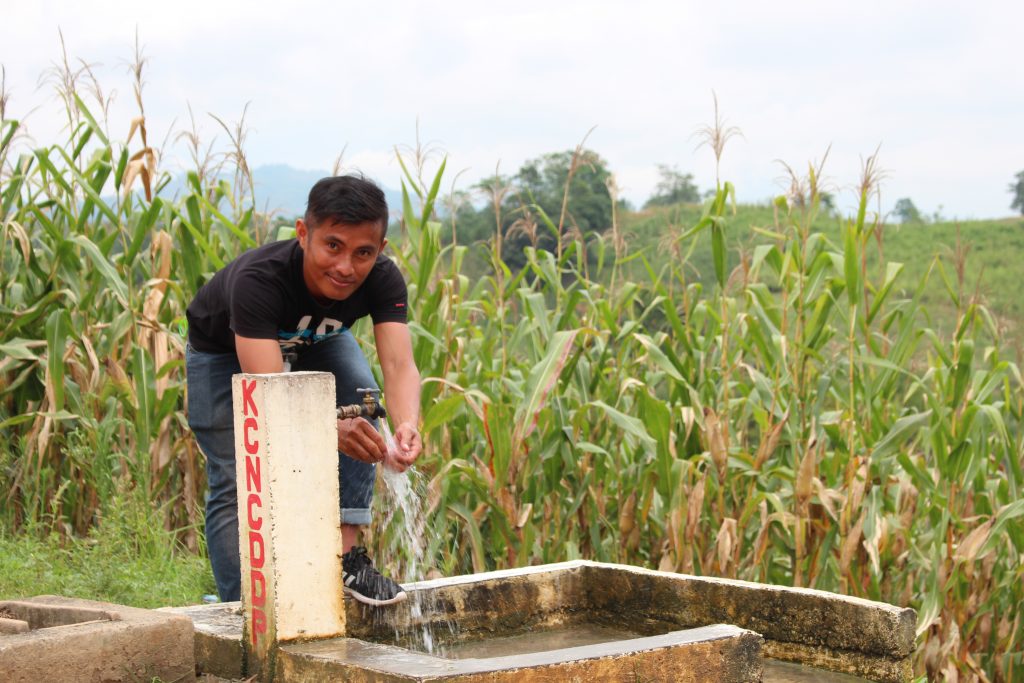When it comes to organizing events and functions in his barangay, Brendo Quitat is a household name. But when KALAHI-CIDSS came in his community, becoming involved in sub-project management is a chance he did not miss.
It was year 2018 when the water system from KALAHI-CIDSS has started improving the living conditions of residents in barangay San Antonio West, Don Carlos, Bukidnon. After years of not being prioritized in the Municipal Inter-Barangay Forum—an event wherein volunteers of KALAHI-CIDSS presented their sub-project proposals, the water system project for San Antonio West was realized. Today, 10 tap stands located in various areas are providing sufficient potable water for the community.
Brendo served as the bookkeeper who managed records and important documentary requirements. Despite being busy as a farmer, Brendo makes time to manage the sub-project together with his fellow volunteers and BSPMC Chairman. According to him, being active in the community is something he takes from his relatives who are public officials in their barangay. But Brendo takes a different perspective.
“Dili na kailangan og posisyon aron makatabang ka sa katawhan. Ang pagka volunteer, usa na ka pamaagi nga naka serve ka, labi na kung para sa kaayohan.” (You don’t need to have a position to help out. Being a volunteer is already public service, especially if it is for the welfare of all.) Says Brendo.
This year, the additional financing of KALAHI-CIDSS in Brgy. San Antontio West will give the residents another opportunity to participate in community-driven development. Brendo says the approach is more people-centered and encourages bayanhihan. “Lahi ra man gud na’ng ma inform ang tanan, unsa’y gikinihanglan, para maka sulti mi, “unsa ma’y among ikatabang?” (It spells a big difference when everyone is informed, the needs are laid out, so we can say “what help do you need from us?)
The community has proposed 14-units of solar street lights, solving concerns over safety and potential street crimes. This time, Brendo heads the Barangay Development Council-Technical Working Group (BDC-TWG) for the sub-project. “Si KALAHI, ga respond siya sa needs sa community. Kung nahimo namo sa water system nga imposible kayo to, why not kini karon.” (KALAHI responds to the needs of the community. If we were successful with our previous sub-project, why not this time?) Brendo said.
“Ang KALAHI, lahi gyud siya. Bahalag kuti. Ang mga vouchers, mga papel, plastar ug dayag. Pinaka na appreciate nako na… Mas mayo awaton sa barangay para secure ang project, ang [implementing] office ug community.”
(KALAHI stands out from the rest. Despite its rigorous process; the vouchers and paper works are intact and transparent. That’s what I appreciate most… It would be beneficial if the barangay adopts the same process so that every project is secured, the implementing office, and the community.)
Brendo gets a little help from his friends on their ongoing sub-project implementation. “Mga batan-on kasagara ang volunteers karon. Dali ra mabunlot. Naa na pod sila’y mga committee.” (Our volunteers now are mostly young people, they are easy to tap whenever needed. They have their own committees.)
When the pandemic discouraged community events and gatherings which Brendo and his youth group used to organize, they have shifted to working for their community’s development.
“Mas naikag ko kay naa na mi tubig, karon madugangan na pod ang among solar street lights, ug excited mi kay mas kusog gyud daw ang siga sa KALAHI.” (I am more eager to lead because we already have potable water, and now, our existing solar street lights will have additional units from KALAHI, which they say are a lot brighter than what we have at the moment.)
“Kung unsa’y output, dili raman pod ni para sa amo, para man sa tanan. Kung unsa’y success namo, success pod sa tanan.” (Our output will benefit not only a few, but the majority. Our success is the success of all.)
Volunteers like Brendo are motivated by several reasons: they want to improve the well-being of their community, they welcome challenges and personal growth, and they want to influence others. Brendo’s experience with KALAHI-CIDSS is a springboard to more leadership opportunities in the future—the empowerment that the Program aspires to see from all who take part in it.



